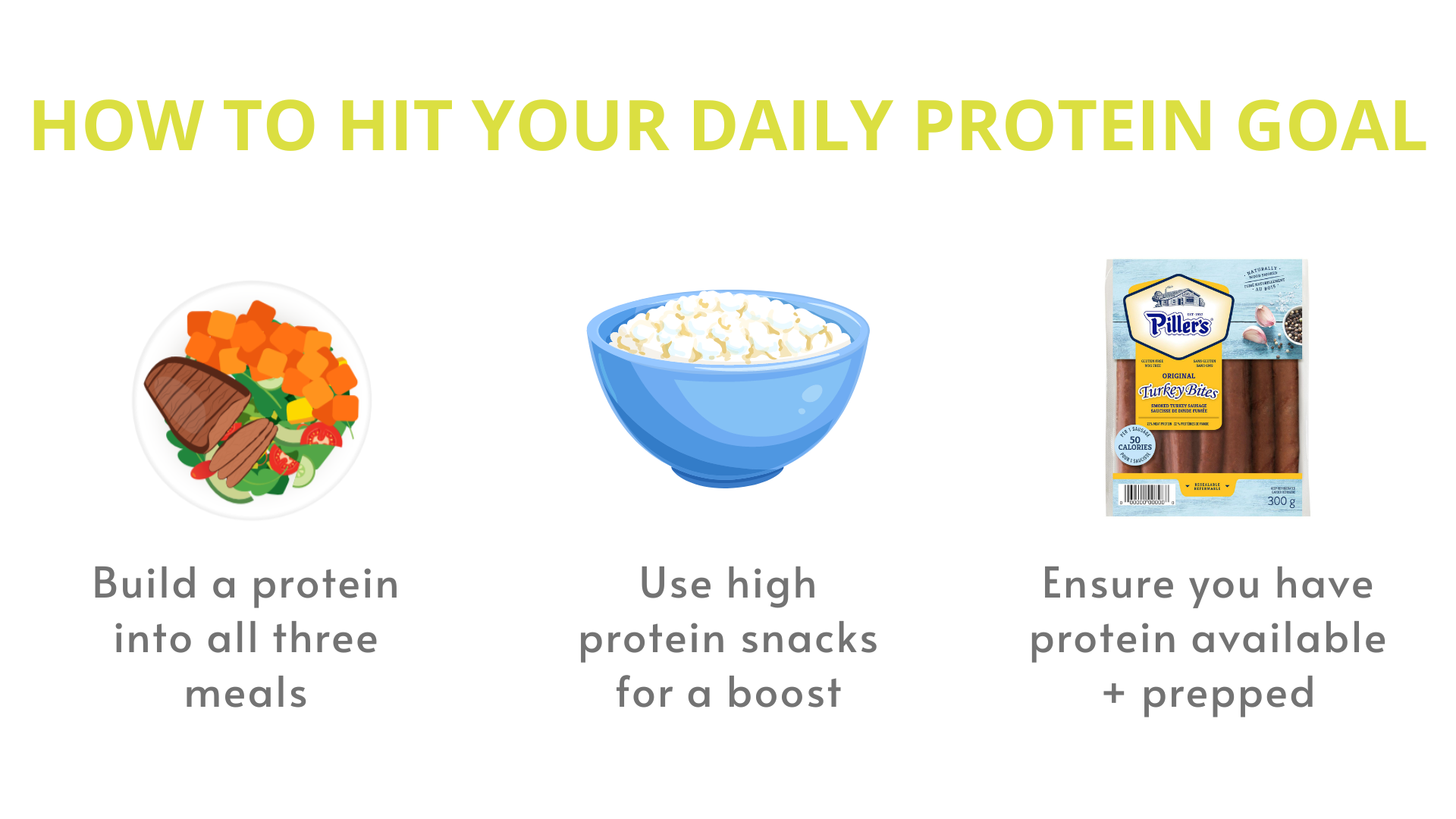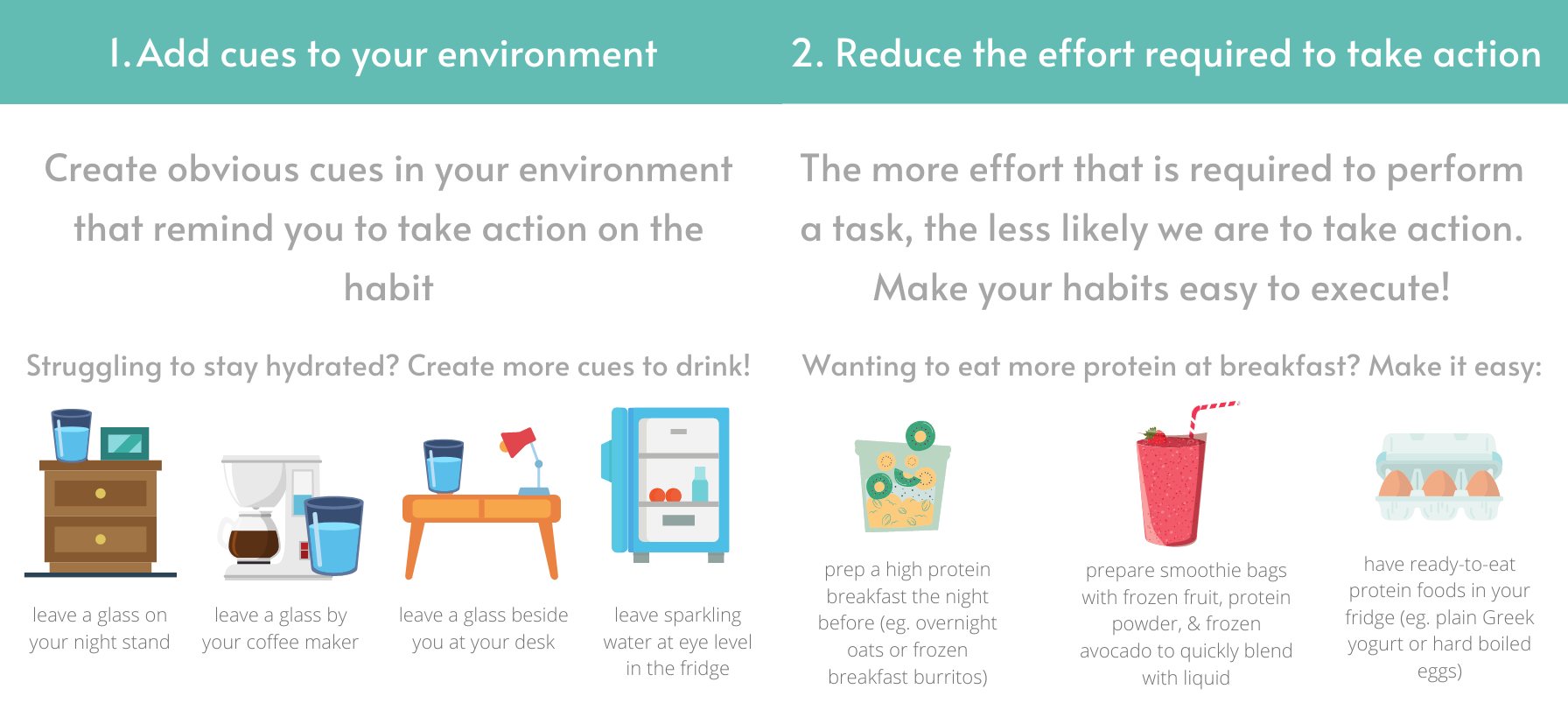Get to Know the Vitality Nutrition Dietitians!
Aug 03, 2022
In the latest episode of the Nutrition Unpeeled Podcast we followed a 3-2-1 prompt as a structure to share three supportive habits we've recently adopted, two unsupportive habits we've ditched, and one piece of advice we'd offer our younger self. You can listen to the full Podcast episode here or read on for a review of what we discussed!
THREE SUPPORTIVE HABITS WE'VE ADOPTED
COURTNEY
1. Building adequate protein into my day. Many people are aware of the benefits of protein including its role in stabilizing blood sugar, making us feel full for longer, aiding in muscle recovery, and boosting metabolism! People who train regularly, especially strength training, benefit from between 0.8-1.0g of protein per pound of body weight (or adjusted body weight*). For those who don't strength train, we've found closer to 100g of protein or more per day to be ideal to increase satiety and fullness and to improve blood sugar balance.

Building protein-rich foods into meals and snacks is a habit I've had for many years. However, recently, I've been more mindful of obtaining 0.8g per pound of body weight (or more) for the benefit of improved muscle recovery and feeling full, reducing cravings, and feel satisfied for longer from meals! Three strategies that have helped me obtain my protein target:
- Ensuring I have at least 30g or more of protein at meals (eg. 4-5 ounces of cooked protein like shrimp, chicken breast, steak, or pork tenderloin; 3/4 cup or more of cottage cheese or Greek yogurt at snacks, adding 1/2 cup of egg whites to boost the protein if I am eating an egg for breakfast, or 1 scoop of protein powder in smoothies).
- Having at least one high protein snack (ie. 15g or more of protein) in my day. (eg. plain Greek yogurt with berries and seeds, a protein bar, a can of oysters, hardboiled eggs with Babybel cheese, a protein smoothie with protein powder, berries, and nut butter).
- Ensuring I have protein prepped and available in my environment. Protein foods tend to take longer to prepare! Having prepped options or buying foods that can be quickly built into meals is a key habit for me to stay consistent with a high protein intake. I like cooking a protein to integrate into meals for the week (eg. BBQing chicken breast or hard-boiling eggs) or keeping quick proteins in the fridge. For example, eggs and egg whites, Greek yogurt, turkey bites, or cottage cheese which can be quickly integrated into meals or snacks!

* Adjusted body weight is a tool dietitian's use to estimate nutritional requirements for individuals who are outside what is classified as the 'normal' weight range for their height. Using adjusted body weight ensures that protein needs are not over or under-estimated.
2. Using light to regulate my sleep and wake cycles. Our sleep and wake cycles are closely regulate by hormones that are influenced by lightness and darkness. Upon waking we have a natural rise in the hormone cortisol that serves to wake us up and increase our energy! Our cortisol levels ebb and flow throughout the day before declining when it is time to go to bed. I've found it helpful to support how wakeful I feel during the day and increase my ability to fall asleep (and stay asleep!) at night with a few daily habits:
- First thing in the morning: I like to open the blinds and let the natural light stream in (if it isn't winter!). This natural light helps to support the morning rise of cortisol making it easier to wake up!
- Mid-morning: I like to prioritize a morning walk (even if it is a quick 10 minutes during my workday) to further support my energy levels. Some research even shows that natural light exposure during the day helps to increase our sleep duration at night!
- Afternoon: cortisol levels naturally take a dip in the afternoon. This, alongside unsupported blood sugars, can cause us to feel sleepy and tired. If it is available to me, I like to work by a window that offers some natural light and/or take a 10-15 minute walk in the afternoon. I find this light exposure to be more effective than a coffee for energizing my body and mind!
- In the evening: After supper, I start to consider how I can decrease my exposure to light. I've found that this helps me fall asleep earlier and wake up less frequently through the night! Light suppresses melatonin (ie. our sleepy hormone!) so if we can limit light exposure and create a darker environment before we plan on sleeping we are more likely to fall asleep and stay asleep. This is tricky in the summer months with the long days! That being said, I do my best to draw the blinds, keep overhead lights off, use dim lights like lamps if I need some light, and even limited blue light from my phone. To do this, I adjusted a setting on my iPhone to block blue light after 8pm via the "displays" section where I adjusted the color temperature to "more warm."
3. Intentionally supporting my nervous system. Understanding and regulating my nervous system has been one of the most powerful tools on my personal health and wellness journey!
Our nervous systems are a network of nerves that act in different key functions to keep our body moving, responding, sensing, digesting, and more. The parasympathetic nervous system (PNS) and sympathetic portions (SNS) are two subdivisons of the autonomic nervous system.
- The PNS is called the rest and digest system. When in this system, our body recovers, sleeps, and digests and absorbs nutrients from food.
- The SNS is called the fight or flight system. In this state, our body is activated to take on stressors in our day. This could be minor stressors like getting up and going to work or more significant stressors like running from a bear!
I consider these systems like a teeter totter where our body seeks balance between the two. I use to spend the majority of my time in the 'fight or flight' system as I had few tools to manage psychological stressors and also took on considerable physical stressors with high intensity workouts and starting a business. I was confused and frustrated that I would have days where my body completely 'crashed!'
After learning about the nervous system I realized my body was demanding the rest it needed after spending too much time in the SNS state. As the quote goes: "if you don't pick a day to relax the body will pick it for you."

Balancing my nervous system by intentionally embracing time in the PNS (rest and digest system) has helped me feel more consistent energy-wise but has also improved my sleep, digestion, and menstrual cycle. What I've found from supporting clients is that everyone is unique in the activities that make them feel relaxed. Some of my key PNS activities include:
- Listening to music
- Going on walks
- Gardening or doing yard work
- Watering my plants
- Spending time in nature
- Enjoying a meal with loved ones
- Cooking and baking
DARIAN
1. Walking in the morning. Walking in the morning is one of my favorite habits to wake up my muscles and brain, circulate blood to prepare me for my mid-morning workout, and have some space to think and prepare for the day! Walking is a habit I use to be consistent with in the morning and recently I've reintroduced a morning walk as one of my priority habits!
2. Water first. Immediately upon waking (and before drinking coffee!) I prioritize drinking one shaker bottle (ie. 700mL) of water. This habit helps to restore my hydration status after a long sleep and also kick starts digestive processes!
3. Scheduling priorities. As part of my morning routine I like to create a list of work and life priorities (eg. work tasks like emails, client meetings, coaching, and projects and life tasks like laundry, workouts, meet-ups, etc). As part of my list, I also like to consider what small actions I can take that will bring my closer to the bigger picture goals I have for my life! You can learn more about this concept in our goal setting blog post here, By listing important tasks I can prioritize my time to ensure these tasks and commitments are completed!
HANNAH
1. If it takes less than 2 minutes, do it now. Taking actions on quick tasks has helped me feel less overwhelmed and more prepared to tackle the day. Completing small tasks immediately means they are less likely to pile up and overwhelm me. For example, this might look like responding to an email immediately rather than putting it off. Plus, this habit even helps me maintain a more tidy and organized home. For example, putting away dishes or laundry.
2. Wash fruit and vegetables immediately after purchasing them and place them in clear containers in the fridge. We discussed the habit of curating our environment in a supportive way in our podcast and article on environment design! I find that by immediately preparing my fruits and vegetables I am more likely to enjoy them throughout the week! By placing them in clear containers I actually see the produce when I open the fridge to ensure it isn't forgotten about!
3. Lay items out the night before to streamline the next day's habits. I like to lay out any items that I need to quickly take action on my supportive habits. For example, setting my gym clothes out, placing the ingredient I need to make protein pancakes for breakfast on the counter, having my snacks ready-to-go, or leaving my book on the bedside table. Not only does this streamline the task itself but it also creates a cue to take action on the habit. When I see my gym clothes I am reminded to workout, when I see my breakfast ingredients I am reminded to make my breakfast, when I see my snacks in the fridge I am reminded to bring them to work, and when I see my book on my bedside table I've created a cue to read! When working towards consistency with your own set of supportive habits, I highly recommend setting your environment up in a way that increases your likeliness of being successful!

TWO UNSUPPORTIVE HABITS WE'VE DITCHED
COURTNEY
- Eating small meals that weren't satisfying me. I use to eat small meals that didn't fully satisfy my appetite. I'd often eat the meal, feel slight hunger, but move along to the next task in my day. This left me hungry or thinking about food again within an hour of my meal! When working with clients through our one-on-one nutrition coaching program we teach that meal frequency (ie. the number of meals and snacks you have throughout the day) is dependent of your lifestyle, personal preference, and workout schedule. However, lately, I've personally felt better when I eat meals that are large enough to satiate me for 3 or more hours. I still have supportive snacks in my day (especially when there is a long gap between meals!), however, I've noticed an improvement into my overall satisfaction, focus, and even productivity when I make my meals large enough to feel fuelled for longer.
- Skipping rest days and/or doing too much high intensity training. Training and exercise is something I enjoy doing. It's one of the best parts of my day! Not only does it make me feel great but it is built into my daily routine as a foundational habit. For this reason, I was finding it difficult to take rest days. However, the lack of rest days was negatively impacting my recovery, performance, hormone balance, and mood. Prioritizing one or more rest days per week is still challenging for me but has been a helpful transition in my health journey. If you are struggling to take rest days my tip is to schedule an event or commitment when you'd normally go to the gym or replace your workout with a walk, household chores, or errands! Our circadian rhythm hormones tend to regulate around consistent parts of our routine - so if your body is used to working at a certain time you may experience a boost in energy due to anticipatory circuits. For this reason, replacing your workout with low impact movement can be a helpful strategy as you transition into taking more rest days!
DARIAN
- Rushing. It could be the season of life I am in, but lately I have noticed that a lot of the things I do I am rushing to. Rushing to the next meeting, rushing to eat, rushing to the gym, rushing to the office, etc. While it might be part of the season of life I am in, it creates a sense of overwhelm even when the things I have to do aren't inherently overwhelming. Scheduling time between tasks and intentionally taking breaks throughout the day has helped me to feel more calm and organized overall.
- Eating meals with distractions. Similar to the above point, I found myself eating meal while scrolling social media or getting ready for the day. By eating with distractions I found that I wasn't fully enjoying my meals! Creating space in my day to eat a meal and really connect to the flavours and textures has been an enjoyable shift. I've even found that taking time to eat distraction-free has improved my digestion. I am able to chew my food well, take breaks between bites, and enter the parasympathetic nervous system which is the state involved with releasing the enzymes required to properly breakdown and absorb nutrients from our meal!
HANNAH
- Hitting snooze and having my phone on bedside table. Hitting the snooze is so tempting because it feels good to be in bed and 5 more minutes would be so rewarding. However, this leaves me in a panic to get ready in the morning! Furthermore, if I wake up when my alarms goes off I actually feel more alert compared to when I drift in and out of sleep for an additional 5-10 minutes. I use my phone as an alarm clock but I place it on the other side of the bedroom so that I have to physically get out of bed to turn it off. This makes it less likely that I will crawl back into bed!
- Comparison to others on social media or people in my life (particularly around workouts, body types, and food choices). Part of this habit may have come with age and feeling more secure in myself, however, the reminder that my body knows what is best for my body is something I come back to. Becoming more set with myself and not comparing has been a powerful shift on my wellness journey!
ONE PIECE OF ADVICE WE'D OFFER OUR YOUNGER SELF
COURTNEY
- Accepting that my approach to nutrition and movement will constantly change and evolve. I use to think that I could "figure it all out" when it comes to nutrition. That is the perfect way to eat to feel my best! However, what I've learned, is that our approach to nutrition is always changing and evolving. This become especially clear to me when I started to work with women on their fertility changes! The nutrition changes we might choose to make to support our menstrual cycle, prepare our body for pregnancy, fuel our body through the pregnancy, and nourish our body post-partum for recovery and breastfeeding all require a unique approach. This approach is entirely different than how we might eat if we didn't have these goals or if we were training as an athlete. Accepting (and even embracing!) that my approach to nutrition gets to grow and change as I do has been an empowering shift. I don't have to have it all 'figured out" and I can tweak and adjust my supportive habits as I move through life.
DARIAN
- "You are not a special snowflake." This quote sounds a bit deflating when you read it for the first time but upon further reflection it can be empowering. It is easy to get caught up in our problems or feel like we are unique in the challenges we experience. While this isn't to take away from the challenging circumstances people encounter, it can be helpful to know that there are not alone in our problems. Reframing challenges has helped me to focus on the choices within my control that will either support my wellness or positively impact how future events unfold.

HANNAH
- Focus on skills to get through life vs focusing on getting through life. Upon reading this quote you might be asking: "what's the difference between these two things?" The latter is a mindset where we are getting through life or solely focusing on 'crossing the finish line.' We may be fixated on an outcome like finishing University, completing the half-marathon, or a nutrition goal like having a healthy relationship with food. However, in our fixation on the outcome we can forget about the skills or the process involved in achieving that end goal. Not only can this distract us on the action steps we need to take to achieve exciting goals but it can also mean that we miss out on the joy in the journey. To me, developing skills to get through life means placing more emphasis on skills to enjoy life instead of solely focusing on the end goal! Slowing down by going for a walk, reading a book, making time for friends, enjoying a delicious meal, and others help me enjoy life rather than rushing through life.
SUMMARY
The habits that will support your health, wellness, and personal goals are unique to you. If you are looking to adopt your own arsenal of supportive habits then we are here to support you through our one-on-one nutrition coaching programs! The dietitians at Vitality Nutrition support clients in Saskatoon, Regina, and across Saskatchewan through our online and in-person meeting options.
You can listen to the full Podcast episode here if you'd like to dive further into these topics.
Ready to bring the evidence-based nutrition support of our Registered Dietitians into your kitchen?
Hungry for more?
Get recipes, tips, and updates from the Vitality Nutrition team straight to your inbox!
Don't worry, your information won't be shared.

